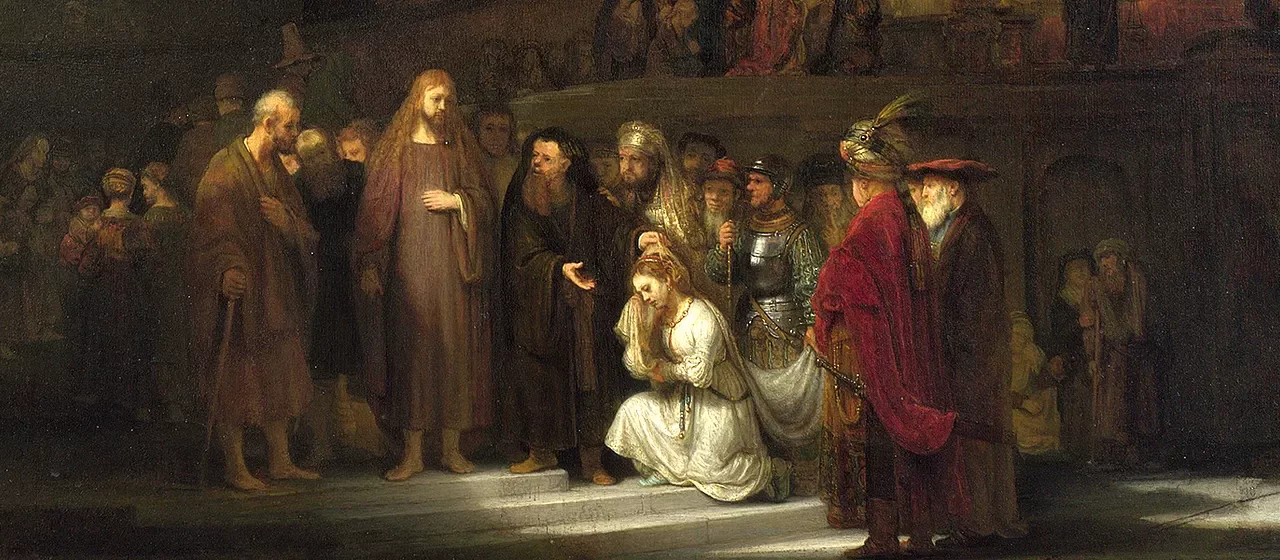At dawn, he appeared again in the temple courts, where all the people gathered around him, and he sat down to teach them. The teachers of the law and the Pharisees brought in a woman caught in adultery. They made her stand before the group and said to Jesus, “Teacher, this woman was caught in the act of adultery. In the Law, Moses commanded us to stone such women. Now what do you say?” They were using this question as a trap, in order to have a basis for accusing him.
But Jesus bent down and started to write on the ground with his finger. When they kept on questioning him, he straightened up and said to them, “Let any one of you who is without sin be the first to throw a stone at her.” Again he stooped down and wrote on the ground.
At this, those who heard began to go away one at a time, the older ones first, until only Jesus was left, with the woman still standing there. Jesus straightened up and asked her, “Woman, where are they? Has no one condemned you?”
“No one, sir,” she said.
“Then neither do I condemn you,” Jesus declared. “Go now and leave your life of sin.”
John 8:1–11
Much has been made of the love of Jesus recently as Christians seek to grapple with the current cultural climate. For progressives, the love of Jesus has become the catch-all for acceptance. Christianity has been reduced to “well, Jesus loved everyone, and we should too, regardless of who they are, where they came from, and how they identify themselves.”
For conservatives, the love of God has been applied in almost the exact opposite way. We can “love the sinner but hate the sin.” This is not surprising as most conservatives (particularly evangelicals) have a worldview more in line with Greek philosophy than with Christ himself. We cannot and should not separate the world into physical and spiritual aspects. It’s precisely this that Paul has a problem with in his letter to Corinth. Our physical and spiritual selves are one and the same. It’s impossible to love the sinner and hate the sin. It simply doesn’t work that way.
In both of these cases, the expression of love is not complete. Love as mere acceptance of who I am at this moment is to leave me in whatever state you found me. Acceptance may be wrapped up in love, but it cannot end there. Love as it exists in the Kingdom of God is always transformational. The love of God seen on the cross and exemplified through the works of fellow Christians should drive us to become more like Jesus, who was and is the truest version of humanity.
In the case of many conservatives who love sinners but hate their sin, we have a tendency to refuse to acknowledge a person’s whole self. Too often, people are reduced to ideas. This often results in condemnation and no empathy for how and why a person got to where they are. “I love you!” we say, “but change this about you!” While we should not fully accept the sinful parts of a person, we cannot also expect them to simply change because we have passed judgment on part of who they are. If we expect to play a role in someone’s growth, we must first enter into the story and life of the whole person. Just as love must be transformational, it must also be incarnational. Jesus always responded to people as people and people as ideas.
In the story quoted at the top of this article, Jesus demonstrates love that is both incarnational and transformative. The Greek tells us a woman was “caught in the act” of adultery. She was grabbed by a group of men and dragged to the temple courts where Jesus was teaching. Interestingly, this story immediately follows the Feast of Tabernacles. Tabernacles was a ‘journey’ festival. A pilgrimage was made by Jews from wherever they lived. Needless to say, the crowd Jesus was interacting with was more than likely very large.
Picture the image. A woman is dragged before this large group of people in the temple in some state of undress. Charges are leveled at her, and Jesus is questioned. “The law says we should stone her. What do you say?”
The text tells us Jesus bent down and drew in the sand. No one knows what he drew or if he wrote something. Perhaps it was nothing. Maybe he was just buying time. He then asks, “If you are without sin, cast the first stone.” The crowd of accusers slowly exits. Jesus looked at the woman and asked her, “Where are your accusers? Have they condemned you?” They had not, and Jesus said he didn’t either. To close the episode, Jesus tells her to go and leave her life of sin.
The love of Jesus is on full display. Jesus enters the moment with this woman. He stands with her in the face of condemnation. His presence in her predicament was powerful. But, he does not leave her as she is. He tells her to go and live differently. His love was both incarnational and transformational.
Ours should be the same. It’s not enough to say, “We should just love people like Jesus did!” if we cannot engage the whole person and help them become more human. If in saying we should love like Jesus we merely mean full acceptance of a person or partial denial of their personhood, we don’t really know the love of Jesus. We must be present. And we must challenge. One without the other is not enough.
